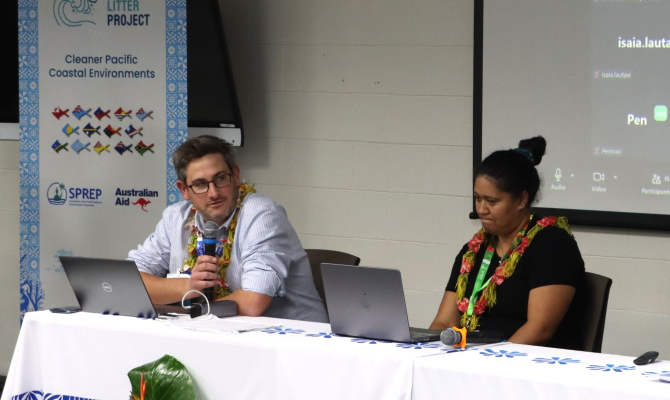
Australia has reaffirmed its commitment to working with Pacific island countries to secure a legally binding, meaningful and effective global treaty to end plastic pollution by 2040.
Representatives progressed efforts during the Pacific Regional Preparatory Meeting, held this week in Apia, Samoa, in the lead up to the second part of the fifth session of the Intergovernmental Negotiating Committee to develop an international legally binding instrument on plastic pollution, including in the marine environment (INC-5.2).
At the meeting, Australia and New Zealand were invited to join roundtable discussions with Pacific Small Island Developing States (PSIDS). The discussions focused on analysing elements of the treaty text and identifying regional strategies to uphold the mandate of UNEA Resolution 5/14, which calls for an international instrument addressing plastic pollution across its entire lifecycle.
Mr. Cameron Hutchison, Head of the Australian Government’s Waste and Resource Recovery Policy Branch, assured Pacific partners of Australia’s ongoing support in the negotiations.
“Australia is committed to end plastic pollution to protect human health and the environment from its adverse effects, and we are working towards an agreement ,that tackles this problem with measures across the full lifecycle of plastics,” Mr. Hutchison stated.
“We recognise the high stakes of this work — especially for Pacific island countries and other small island developing states that are disproportionately impacted by plastic pollution.”
Tackling plastic pollution is a priority for Australia. Mr. Hutchison also highlighted Australia’s national efforts, including boosting recycling infrastructure, phasing out single-use plastics, and transforming packaging regulations — all of which complement its international ambition.
“We need globally coordinated approaches that support and guide national action. This process must deliver a meaningful pathway forward that gives certainty and support to all economies as seek to end plastic pollution.”
At the United Nations Ocean Conference (UNOC) in Nice last month, Australia’s Minister for the Environment and Water, Hon. Murray Watt, declared that a strong global response through the plastic pollution treaty negotiations is urgently required to stem the flow of plastics into our ocean and ensure a sustainable ocean economy.
Minister Watt also called on all negotiators to come together in Geneva, this August, and agree the text for an effective global treaty covering the full life cycle of plastic that the planet and people are calling for.
Australia has been working with Pacific island delegates to secure outcomes for our region since the negotiations started in 2023, collaborating in negotiations and supporting regional Pacific preparatory meetings before each of the five INC sessions held so far. This week’s meeting in Apia, and the upcoming INC-5.2 in Geneva, Switzerland, are supported by Australia.
“As a SPREP member and our largest core contributor, Australia continues to demonstrate genuine partnership in responding to the urgent environmental challenges our region faces,” said Mr. Anthony Talouli, the Secretariat of the Pacific Regional Environment Programme’s (SPREP) Director of Waste Management and Pollution Control.
“We welcome both Australia and New Zealand in the room as we navigate this complex treaty process to ensure the best outcome for our Pacific region. We are small in size, but we bring a big voice, one grounded in the lived realities of ocean-based communities facing the brunt of plastic pollution”.
Australia is also partnering with SPREP to strengthen regional action on marine plastic pollution through the Australian Aid funded Pacific Ocean Litter Project (POLP), which is supporting Pacific island countries to reduce the volume of single-use plastics ending up as litter in Pacific coastal environments.
The POLP is assisting Pacific island countries to undertake coastal monitoring, implement legislated or voluntary single-use plastic bans, identify and introduce sustainable substitutes, increase consumer awareness, and work with Pacific tourism organisations and businesses to adopt single-use plastic reduction measures.
The Pacific Regional Preparatory meeting for the second part of the fifth session of the Intergovernmental Negotiating Committee to develop an international legally binding instrument on plastic pollution (INC-5.2) is this week in Apia, Samoa from 7-9 July 2025.
Facilitated by SPREP, the workshop is funded by the Government of Australia through the Pacific Ocean Litter Project (POLP). The INC-5.2 Pacific Regional Preparatory Meeting is attended by Australia, Cook Islands, Federated States of Micronesia, Fiji, Kiribati, Nauru, New Zealand, Niue, Palau, Papua New Guinea, Samoa, Tonga, Tuvalu and Vanuatu.